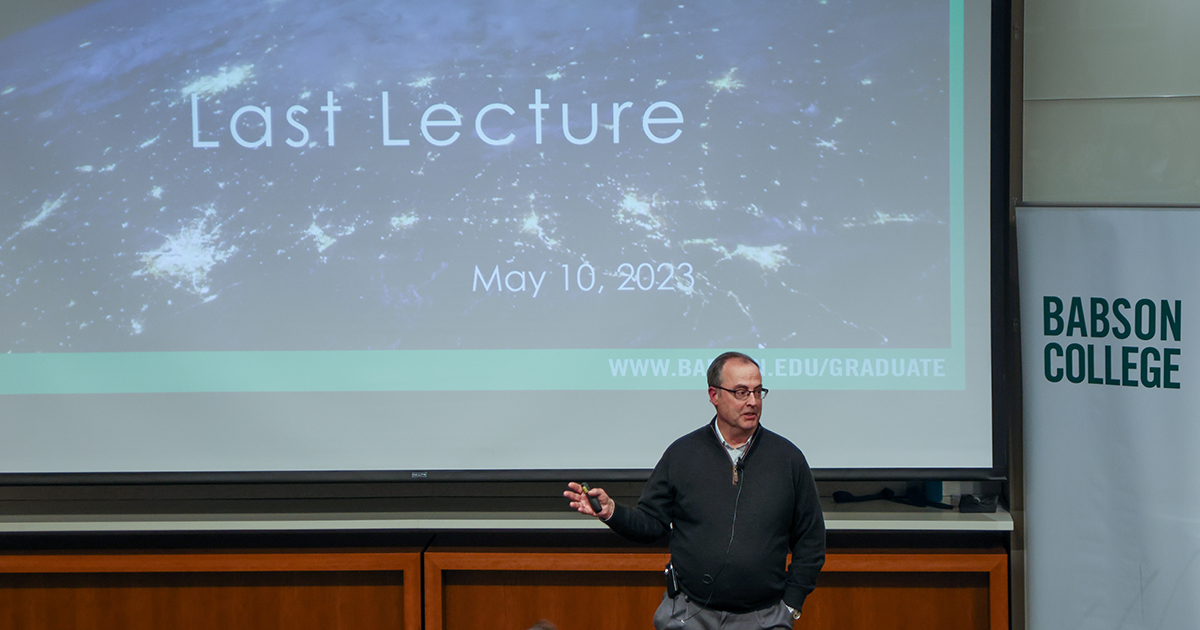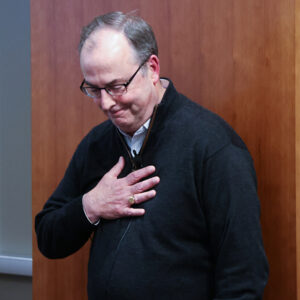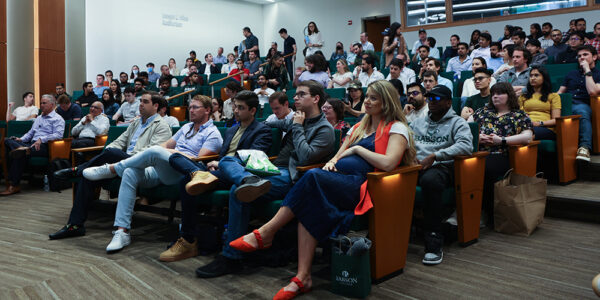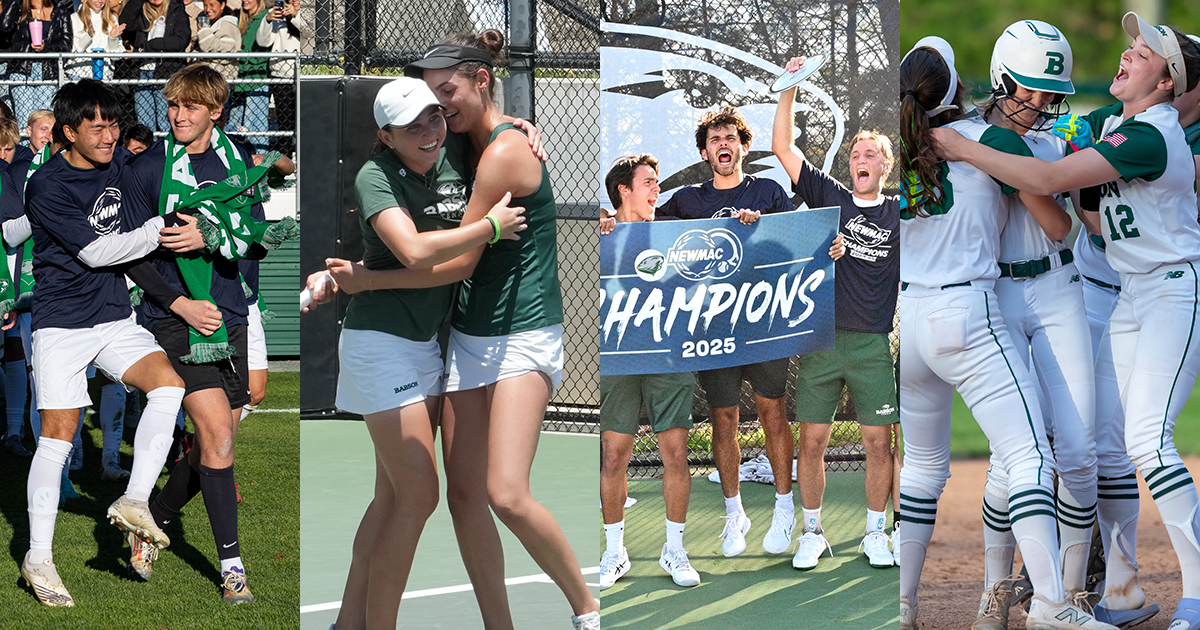Big Ideas and Timeless Questions at the Last Lecture

For Richard Goulding, the first lecture each semester is his favorite. “The first lecture is a privilege, and it’s so exciting,” he said. “You have no idea where you’re going to go.”
On Wednesday, though, he was given the honor of delivering the traditional Last Lecture at the F.W. Olin Graduate School of Business, and he took Babson College’s graduate students to unexpected places.
Goulding, an associate professor of practice in operations and information management, spoke about creative destruction, the Cathedral of Notre Dame in Paris, and a timeless code that stretches back nine centuries.

Goulding was selected by Babson’s graduate Class of 2023 to give the Last Lecture as the winner of the Thomas Kennedy Award for Teaching Excellence. “As a student of Professor Goulding’s,” said Martha Buckley MBA’23 in presenting the award, “I can truly say that he has changed the way I value myself, the value I can create in the world, and the way that all of us as students should be looking at the role of business in today’s world.”
Goulding, who had been a finalist for the Kennedy Award three times previously, was nearly speechless about the award afterward. “Hard to put in words, but it means a tremendous amount, obviously, coming from the students,” he said. “It’s very special.”
As Goulding accepted his award, balloons, hats, and celebratory drinks were being set up outside Roger’s Pub for the graduate students to join President Stephen Spinelli Jr. MBA’92, PhD to toast Babson’s remarkable 30th consecutive year ranked as the No. 1 MBA in Entrepreneurship by U.S. News & World Report.
A Timeless Code
Goulding began his lecture in front of a full house at Joseph L. Winn Auditorium by describing creative destruction, the economic theory of an incessant force driving capitalism. “In essence,” he said, “what creative destruction means is that in order to create, we must destroy.”
And, he posed a question: “Are there things that mean so much to us—are there things that mean so much to you—that they defy this force?”
Goulding offered evidence that the answer might be yes by telling the story of the reconstruction of Notre Dame following the horrific 2019 fire that nearly destroyed the icon of Paris. In particular, he focused on Les Compagnons, the 900-year-old guild of craftspeople who originally built the cathedral and who are painstakingly rebuilding it exactly as it once stood with its original materials.
LISTEN: Richard Goulding on the Compagnons during his Last Lecture:
“This moved me when it happened, and I was just so interested in the story,” said Goulding, who also is the faculty director of the Master’s of Science in Management and Entrepreneurial Leadership (MSEL) program at Babson. “What I love about them is they seem to be a counteracting force” against the force of creative destruction.
Goulding compared the Compagnons to Babson’s graduate students. “The Compagnons dedicate themselves to society,” he said, encouraging students to follow the same timeless code of the craftspeople: 1. I own the problems I see; 2. No job is below me; 3. No job is above me; and 4. My name lives on in the work I leave behind.
“Ask yourself: What are you leaving behind for the people that are going to be coming after you?” Goulding said. “You are leaving a lot behind—a big piece of you is in our hearts and will never leave.”

Words of Wisdom
Goulding’s Last Lecture was preceded by four colleagues sharing their words of wisdom and advice to the graduating grad students.
Jay Rao, professor of operations management, encouraged students to be interested instead of interesting, to be learners instead of knowers, to demonstrate humility instead of hubris. He noted that there is an abundance of MBAs globally, but Babson entrepreneurial leaders remain a scarce commodity.
“You are uniquely trained to think like a (CEO),” Rao said. “Entrepreneurial leaders don’t wait for things to be handed down to you. You are the one who leads change.”
John Hallal, adjunct lecturer of entrepreneurship, emphasized the need to be authentic, relaying an early tough lesson he learned about not being true to yourself in your career. He urged students to not separate business and pleasure, to give up perfection, to not be afraid to tell their story, and to be earnest.
“To me, it’s all about feeling connected to yourself, to your loved ones, to your business colleagues,” Hallal said. “So, I suggest you be the ‘auth’ in authenticity, and be the author of your own story and make it a successful one.”
“Value what you have, live and enjoy what you have, enjoy your family, your friends, your mentors, your successes, even your failures.”
Lidija Polutnik, professor of economics
Lidija Polutnik, professor of economics, offered 10 lessons to live your life by thinking like an economist. Among them: “Cooperation is better than competition” and “Every economic choice involves an opportunity cost.”
“Put yourself in a place where you’re happy, where you are doing exactly what you want to be doing,” Polutnik said. “The most important resource that we have is time. Value what you have, live and enjoy what you have, enjoy your family, your friends, your mentors, your successes, even your failures.”
Anirudh Dhebar, professor of marketing and multiple Kennedy Award winner, displayed his love of the Beatles. At the conclusion of a presentation jam-packed with advice, he played a song and recited the famous John Lennon lyrics of “Nowhere Man.”
“Promise me you will never be a nowhere person. So, if you’re not going to be a nowhere person, the last piece of advice: Fly as high as you can fly,” he said. “The moral imperative of humanism is to see how high you can fly. But for that, here’s what you need …”
He then played another iconic song and led students in singing Lennon’s lyrics: “Imagine all the people living for today.”





